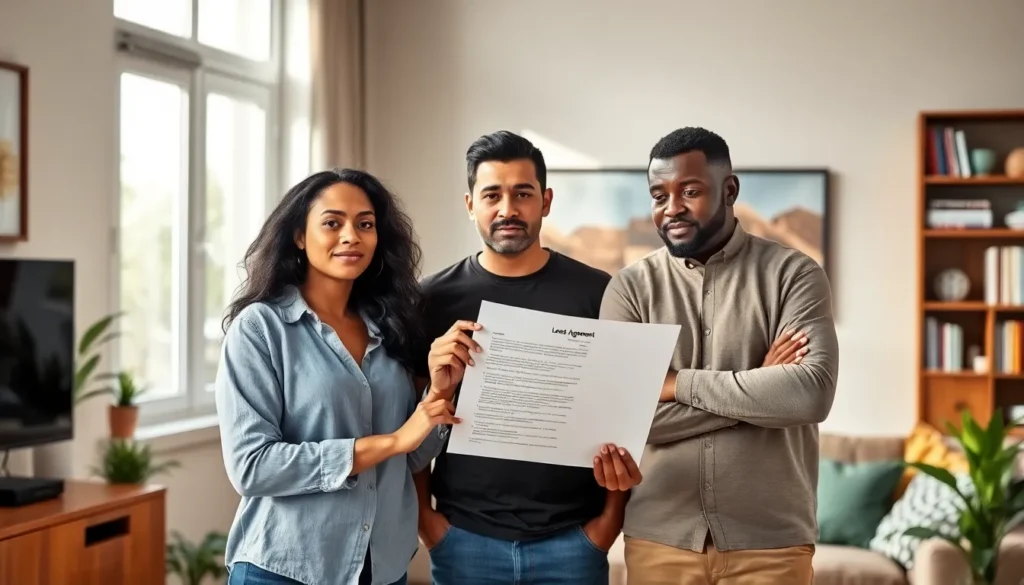Navigating the world of rental agreements can feel like trying to solve a Rubik’s Cube blindfolded. Tenants often find themselves tangled in a web of confusing legal jargon and unexpected landlord antics. That’s where an attorney for tenant rights steps in, armed with knowledge and a hefty dose of legal savvy.
Imagine having a legal superhero on speed dial, ready to swoop in and save the day when your landlord decides to play hardball. Whether it’s battling over security deposits or deciphering lease agreements, having an attorney by your side can make all the difference. It’s not just about knowing your rights; it’s about ensuring you’re treated fairly in a rental market that can sometimes feel a bit like the Wild West. So, if you’re ready to take charge of your living situation, it’s time to consider getting some expert legal backup.
Table of Contents
ToggleUnderstanding Tenant Rights
Tenants possess specific rights that protect them in rental agreements and living situations. Understanding these rights empowers individuals to advocate for fair treatment.
Common Tenant Rights Explained
Common tenant rights include the right to a habitable living environment, receiving security deposits back, and privacy within the rental unit. Tenants often have the right to request repairs, ensuring landlords maintain essential services. Fair housing protections prohibit discrimination based on race, gender, or disability. These rights create a framework that tenants can rely on, guiding their interactions with landlords.
Importance of Knowing Your Rights
Knowing one’s rights enhances a tenant’s ability to navigate disputes effectively. Understanding these rights equips individuals to recognize violations and take appropriate action. Awareness of legal protections can deter landlords from unfair practices, fostering a more equitable rental market. Tenants informed about their rights often find it easier to communicate with landlords and resolve conflicts amicably. Seeking legal assistance ensures comprehensive understanding and effective enforcement of these rights.
Role of an Attorney for Tenant Rights

An attorney for tenant rights plays a crucial role in protecting tenants from unfair practices within the rental market. Legal expertise offers tenants greater understanding of their rights and legal options.
Services Provided by Tenant Attorneys
Tenant attorneys provide various services aimed at safeguarding tenants’ interests. They review lease agreements for potential issues. They offer advice on tenant rights, including habitability and discrimination protections. Representation in court during eviction proceedings ensures tenants receive fair hearings. Negotiating with landlords over security deposits is another key service. The attorney’s guidance empowers tenants to confidently address disputes.
When to Hire an Attorney
Knowing when to hire an attorney is vital for tenants facing rental challenges. Contacting an attorney early in the eviction process minimizes legal complications. If a landlord fails to perform necessary repairs or violates lease terms, legal intervention may be necessary. Consulting with an attorney becomes critical when facing discrimination in housing. Tenants should also seek legal assistance for understanding complex lease agreements. Early engagement increases the likelihood of achieving favorable outcomes in disputes.
How to Choose the Right Attorney for Tenant Rights
Choosing the right attorney for tenant rights requires careful consideration. Selecting an attorney skilled in housing law ensures adequate support and guidance.
Factors to Consider
Experience plays a crucial role when evaluating potential attorneys. Consider the attorney’s specialization in tenant rights or housing law. Their track record with similar cases can indicate effectiveness. Reputation matters; read reviews or seek referrals from trusted sources. Availability for direct communication is essential; ensure they can dedicate time to your case. Location also affects practicality; finding an attorney familiar with local laws streamlines the process. Cost should be discussed upfront, ensuring the chosen attorney aligns with your budget.
Questions to Ask Potential Attorneys
Initial consultations offer a chance to gauge compatibility. Start by inquiring about their experience with tenant rights cases. Ask how they approach disputes involving landlords. Clarify their fee structure to avoid surprises later. Understanding their success rate with eviction cases and security deposit disputes provides valuable insight. Request references from past clients; these testimonials help assess their communication style and effectiveness. Lastly, discuss their availability; confirming regular updates can facilitate a smoother legal process.
Resources for Tenants
Tenants can access various resources to better understand their rights and seek assistance. These resources include local and national organizations offering support.
Local and National Organizations
Organizations at both local and national levels provide crucial assistance to tenants. The National Low Income Housing Coalition focuses on advocating for affordable housing. Similarly, local legal aid societies often offer free or low-cost legal services to tenants facing eviction or disputes. Tenants can also find help through the tenant unions that promote tenant rights and foster community activism. Another resource, the U.S. Department of Housing and Urban Development, provides information on housing discrimination and fair housing laws.
Online Tools and References
Numerous online tools and references support tenants navigating their rights. Websites like Nolo and Legal Aid offer comprehensive guides on tenant protections and legal frameworks. State-specific housing authority websites publish resources tailored to local laws and regulations. In addition, the American Bar Association’s online resources educate tenants about their rights and responsibilities. Blogs dedicated to tenant rights provide updates on legal changes, case law, and helpful tips for renters.
Navigating the complexities of rental agreements and tenant rights can be daunting. Having an attorney for tenant rights can make a significant difference in ensuring fair treatment and protecting one’s interests. Legal expertise not only clarifies rights but also empowers tenants to stand up against unfair practices.
With the right attorney, tenants can effectively address issues like eviction, necessary repairs, and discrimination. This support is crucial in fostering a more equitable rental market. By understanding their rights and seeking legal assistance when needed, tenants can confidently advocate for themselves and secure a better living environment.








